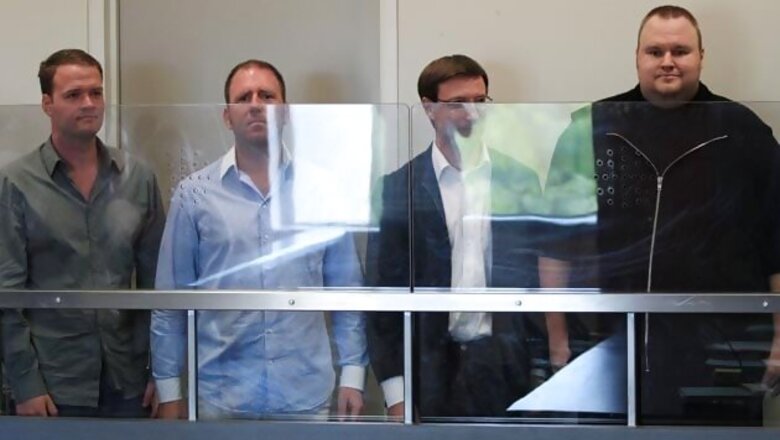
views
Wellington: With 150 million registered users, about 50 million hits daily and endorsements from music superstars, Megaupload.com was among the world's biggest file-sharing sites. Big enough, according to a US indictment, that it earned founder Kim Dotcom $42 million last year alone.
The movie industry howled that the site was making money off pirated material. Though the company is based in Hong Kong and Dotcom was living in New Zealand, some of the alleged pirated content was hosted on leased servers in Virginia, and that was enough for US prosecutors to act.
The site was shut down on Thursday, and Dotcom and three Megaupload employees were arrested in New Zealand on US accusations that they facilitated millions of illegal downloads of films, music and other content, costing copyright holders at least $500 million in lost revenue.
New Zealand Police also seized guns, artwork, more than $8 million in cash and luxury cars valued at nearly $5 million after serving 10 search warrants at several businesses and homes around the city of Auckland.
News of the shutdown seemed to bring retaliation from hackers who claimed credit for attacking the Justice Department's website. Federal officials confirmed it was down for hours Thursday evening and that the disruption was being "treated as a malicious act."
A loose affiliation of hackers known as "Anonymous" claimed credit for the attack. Also hacked was the site for the Motion Picture Association of America.
On Friday, New Zealand's Fairfax Media reported that the four defendants stood together in an Auckland courtroom in the first step of extradition proceedings that could last a year or more.
Dotcom's lawyer raised objections to a media request to take photographs and video, but then Dotcom spoke out from the dock, saying he didn't mind photos or video "because we have nothing to hide." The judge granted the media access, and ruled that the four would remain in custody until a second hearing Monday.
Dotcom, Megaupload's former CEO and current chief innovation officer, is a resident of Hong Kong and New Zealand and a dual citizen of Finland and Germany who had his name legally changed. The 37-year-old was previously known as Kim Schmitz and Kim Tim Jim Vestor.
Two other German citizens and one Dutch citizen also were arrested and three other defendants - another German, a Slovakian and an Estonian - remain at large.
The Electronic Frontier Foundation, which defends free speech and digital rights online, said in a statement that the arrests set "a terrifying precedent. If the United States can seize a Dutch citizen in New Zealand over a copyright claim, what is next?"
The indictment was unsealed one day after websites including Wikipedia and Craigslist shut down in protest of two congressional proposals intended to make it easier for authorities to go after sites with pirated material, especially those with overseas headquarters and servers.
Before Megaupload was taken down, the company posted a statement saying allegations that it facilitated massive breaches of copyright laws were "grotesquely overblown."
"The fact is that the vast majority of Mega's Internet traffic is legitimate, and we are here to stay. If the content industry would like to take advantage of our popularity, we are happy to enter into a dialogue. We have some good ideas. Please get in touch," the statement said.
Several sister sites were also shut down, including one dedicated to sharing pornography files.
The $8 million in cash seized had been invested in various New Zealand financial institutions, and has been placed in a trust pending the outcome of the cases.
Police spokesman Grant Ogilvie said the seized cars include a Rolls Royce Phantom Drophead Coupe worth more than $400,000. Two short-barreled shotguns and a number of valuable artworks were also confiscated, he added.
According to the indictment, Megaupload was estimated at one point to be the 13th most frequently visited website on the Internet. Current estimates by companies that monitor Web traffic place it in the top 100.
Megaupload is considered a "cyberlocker," in which users can upload and transfer files that are too large to send by email. Such sites can have perfectly legitimate uses. But the Motion Picture Association of America, which has campaigned for a crackdown on piracy, estimated that the vast majority of content being shared on Megaupload was in violation of copyright laws.
The website allowed users to download some content for free, but made money by charging subscriptions to people who wanted access to faster download speeds or extra content. The website also sold advertising.
Megaupload was unique not only because of its massive size and the volume of downloaded content, but also because it had high-profile support from celebrities, musicians and other content producers who are most often the victims of copyright infringement and piracy. Before the website was taken down, it contained endorsements from Kim Kardashian, Alicia Keys and Kanye West, among others.
The company listed Swizz Beatz, a musician who married Keys in 2010, as its CEO. He was not named in the indictment and declined to comment through a representative.
The five-count indictment, which alleges copyright infringement as well as conspiracy to commit money laundering and racketeering, described a site designed specifically to reward users who uploaded pirated content for sharing, and turned a blind eye to requests from copyright holders to remove copyright-protected files.
For instance, users received cash bonuses if they uploaded content popular enough to generate massive numbers of downloads, according to the indictment. Such content was almost always copyright protected, the indictment said.
The Justice Department said it was illegal for anyone to download pirated content, but their investigation focused on the leaders of the company, not end users who may have downloaded a few movies for personal viewing.
A lawyer who represented the company in a lawsuit last year declined to comment Thursday. Efforts to reach an attorney representing Dotcom were unsuccessful.
Although Megaupload is based in Hong Kong, the size of its operation in the southern Chinese city was unclear. The administrative contact listed in its domain registration, Bonnie Lam, did not respond immediately for a request for comment sent to a fax number and email address listed.
The indictment was returned in the Eastern District of Virginia, which claimed jurisdiction in part because some of the alleged pirated materials were hosted on leased servers in Ashburn, Va. Prosecutors there have pursued multiple piracy investigations.
The Justice Department also was investigating the "significant increase in activity" that disrupted its website. It said in a statement that it was working to "investigate the origins of this activity, which is being treated as a malicious act until we can fully identify the root cause."
The site appeared to be working again late Thursday. A spokesman for the Motion Picture Association of America said in an emailed statement that the group's site also had been hacked, but it too appeared to be working later in the evening.
"The motion picture and television industry has always been a strong supporter of free speech," the spokesman said. "We strongly condemn any attempts to silence any groups or individuals."




















Comments
0 comment